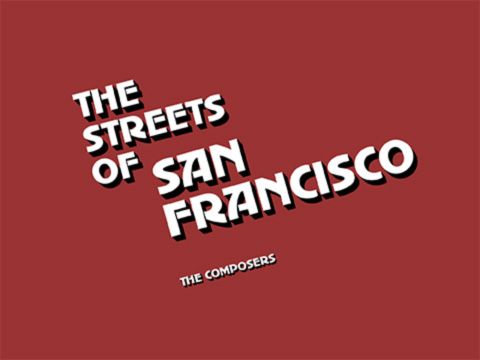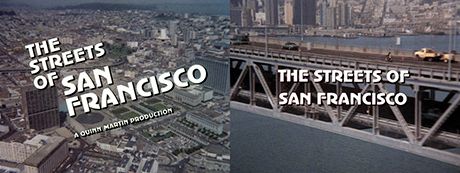 |
 |
| View Mode |
| Regular | Headlines |
 |
| All times are
PT (Pacific Time), U.S.A.
|
 |
|
 |
|
 |
 |
| The Streets of San Francisco: The Composers |
| Posted By: Thomas Rucki on March 11, 2013 - 4:00 AM |
|
|
 |
|
|
 We're going to investigate the many composers that contribute to the series during the five seasons (1972-1977). QM music head John Elizalde keeps his status of music supervisor and, as composer Pat Williams, write scores season after season. We're going to investigate the many composers that contribute to the series during the five seasons (1972-1977). QM music head John Elizalde keeps his status of music supervisor and, as composer Pat Williams, write scores season after season.
|
|
|
|
|
|
|
|
|
|
|
|
|
|
Byers, Billy: “45 Minutes From Home” |
|
|
Elizalde, John: “The Bullet” |
|
|
Mention, Michel: “A Collection Of Eagles” |
|
|
Parker, John: “The Set-Up” |
|
|
Prince, Robert: “Hall Of Mirrors” |
|
|
Scott, Tom: “The First Day Of Forever”, “Timelock” |
|
|
Williams, Pat: “Pilot”, “The Thirty-Year Pin”, “Tower Beyond Tragedy”,
“In The Midst Of Strangers”, “Bitter Wine”, “Act Of Duty”
|
|
|
|
|
|
|
|
Notes |
The season theme music is different from the pilot mainly because of a standard use of the electric guitar and the less prominent Afro-Cuban percussions. The creator of the series theme Pat Williams dominates the season with six scores. His pilot and “The Thirty-Year Pin” scores will be partly derived in a Mannix score entitled “One Step to Midnight”. Composer William Mitchell ‘Billy’ Byers is first a jazz trombonist, an arranger and an orchestrator. QM Music department head John Elizalde writes one score. French composer Michel Mention is first an arranger and then becomes the assistant of Maurice Jarre from the 1980’s. John Carl Parker works mostly for CBS (see The Wild Wild West, Gunsmoke), MGM (see Medical Center, Assignment: Vienna) and QM (see Cannon, Barnaby Jones). Robert Prince is known for a film (You’re a Big Boy Now) by Francis Ford Coppola, three popular series at CBS (see The Wild Wild West, Mission: Impossible and Mannix) and as part of Universal television home composers during the 1970’s (see Rod Serling’s Night Gallery, The Name of the Game, Cool Breeze, The Sixth Sense, Banacek, Circle of Fear, Ironside). Son of composer Nathan Scott, musician Thomas Wright Scott originally belongs to the jazz fusion crowd as a saxophonist and a band leader for the L.A. Express, gives a single score (Conquest of the Planet of the Apes) for the saga of Planet of the Apes and writes for many cop series as Baretta and Starsky & Hutch. Pat Williams used to release an album entitled "Threshold" (1973) along with Billy Byers and Tom Scott that's why they're part of the series. The total amount of scores is 13 with 7 composers. This is the most varied season of all.
|
|
|
|
|
|
|
|
|
|
|
Elizalde, John: “The Twenty-Four Karat Plague”, “Most Feared In The Jungle” |
|
|
Markowitz, Richard : “Shield Of Honor” |
|
|
Tatro, Duane: “Before I Die”, “The Stamp Of Death” |
|
|
Williams, Pat: “Going Home” |
|
|
|
|
|
|
|
Notes |
|
The season theme music is hardly re-orchestrated. The amount of original scores severely drops and Pat Williams only writes a single score and tames his hard edge street funk leaning. A new composer pops up into the series: Richard Markowitz, former creator of the theme music from The Wild Wild West and also works for CBS series (see Mission: Impossible and Mannix) and QM (see The Invaders, The FBI). Musician Duane Tatro belongs to the 1950’s jazz crowd as a tenor sax and as an arranger—he used to play with Stan Kenton and collaborate with Lennie Niehaus—, work exclusively for QM Productions but nevertheless gives scores for CBS (see Mission: Impossible and Mannix) and his “Before I Die” score will be re-recorded in the next seasons. The total amount of scores is 6 with 4 composers.
|
|
|
|
|
|
|
|
|
|
|
Byers, Billy: “One Chance To Live” |
|
|
Elizalde, John: “Target: Red” |
|
|
Markowitz, Richard: “The Most Deadly Species”, “Mask Of Death” |
|
|
Williams, Pat: “One Last Shot” |
|
|
|
|
|
|
|
Notes |
|
The season theme music is frankly re-orchestrated because the first notes are faster with a dominant drum, the electric guitar is hardly heard and the brass section is slower. Composer Billy Byers returns after one season of absence. Composer John Elizalde’s single score entitled “Target: Red” will be re-recorded in the next seasons. The total amount of scores is 5 with 4 composers.
|
|
|
|
|
|
|
|
|
|
|
Elizalde, John: “Poisoned Snow” |
|
|
Markowitz, Richard: “No Place To Hide” |
|
|
Parker, John: “School Of Fear” |
|
|
Romanis, George: “Trail Of Terror” |
|
|
Tatro, Duane: “Merchants Of Death” |
|
|
Williams, Pat: “The Glass Dart Board” |
|
|
|
|
|
|
|
Notes |
|
The season theme music is frankly re-orchestrated, plays faster than previously and the brass section is used differently. A brand new composer enters the series: George Romanis, a regular from Bruce Geller series as Mission: Impossible and Mannix. John Parker comes back after two seasons of absence. The total amount of scores is 6 with 6 composers.
|
|
|
|
|
|
|
|
|
|
|
Drasnin, Robert: “Interlude” |
|
|
Elizalde, John: “Breakup” |
|
|
Markowitz, Richard: “Hot Dog” |
|
|
Smalley, John Peter: “The Drop” |
|
|
Tatro, Duane: “Castle of Fear” |
|
|
Williams, Pat: “The Thrill Killers” |
|
|
|
|
|
|
|
Notes |
The season theme music is entirely re-orchestrated and dressed by an electric harpsichord replacing the electric piano and the wah wah electric guitar is almost substituted by a drum. Pat Williams receives an onscreen credit for a two-parter (“The Thrill Killers”) with his full name. Two newcomers step into the series: Robert Drasnin, a regular from 1960’s spy series (see The Man from U.N.C.L.E., The Wild Wild West, I Spy, Mission: Impossible) and John Peter Smalley. The total amount of scores is 6 with 5 composers.
|
|
|
|
|
|
|
|
|

|
 |
|
 |
 |
 |
 |
 |
 |
 |
Today in Film Score History:
April 26 |
 |
| Alan Parker begins recording his score for Jaws 3D (1983) |
 |
| Barry Gray died (1984) |
 |
| Bronislau Kaper died (1983) |
 |
| Bruce Broughton begins recording his score The Blue and the Gray (1982) |
 |
| Carmine Coppola died (1991) |
 |
| Dave Grusin begins recording his score for The Firm (1993) |
 |
| David Bell records his score for the Star Trek: Deep Space Nine episode “Tracking Into the Wind” (1999) |
 |
| Francis Lai born (1932) |
 |
| Giorgio Moroder born (1940) |
 |
| Jerry Fielding begins recording his score for Gray Lady Down (1977) |
 |
| John M. Keane born (1965) |
 |
| Maurice Jarre begins recording his score for Distant Thunder (1988) |
 |
| Miklos Rozsa begins recording his score for Green Fire (1954) |
 |
| Paul Sawtell and Bert Shefter record their score for Kronos (1957) |
 |
| Reinhardt Wagner born (1956) |
 |
 |
|
|
 |
|















 We're going to investigate the many composers that contribute to the series during the five seasons (1972-1977). QM music head
We're going to investigate the many composers that contribute to the series during the five seasons (1972-1977). QM music head 

